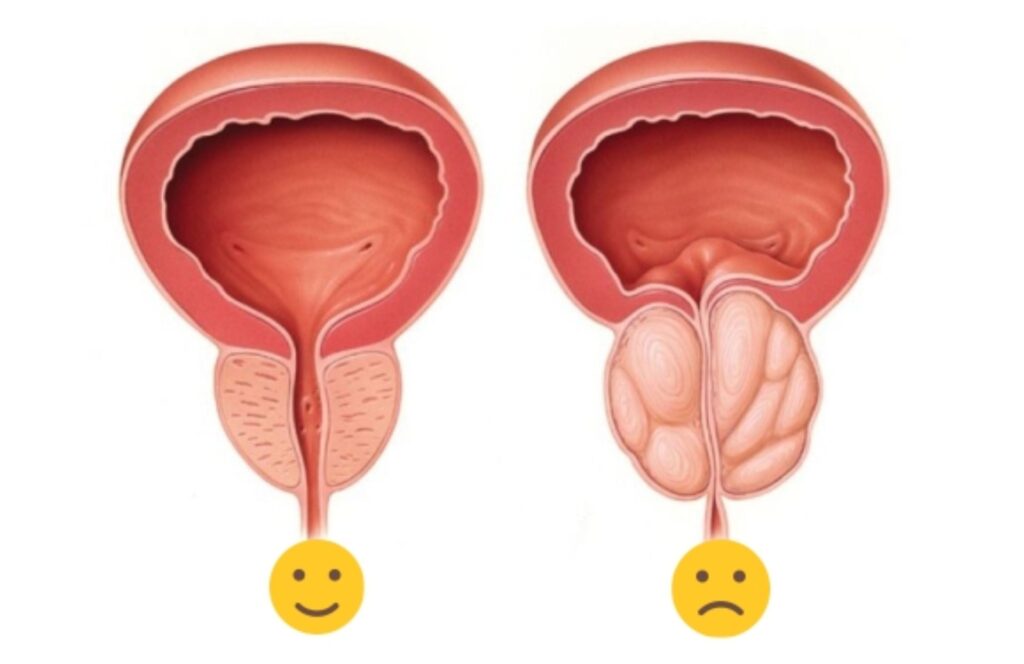Overview Of Benign prostatic hyperplasia (BPH)
Benign Prostatic Hyperplasia (BPH) is a non-cancerous enlargement of the prostate gland that commonly occurs as men age. It leads to the compression of the urethra and can cause various urinary symptoms, such as frequent urination, weak urine flow, and difficulty emptying the bladder. BPH is a benign condition, but it can significantly affect quality of life.
Symptoms of Benign prostatic hyperplasia (BPH)
- - Frequent Urination: Particularly at night (nocturia). - Weak Urinary Stream: Difficulty starting or stopping urination. - Urgency: A strong, sudden urge to urinate. - Incomplete Emptying: Feeling of incomplete bladder emptying. - Dribbling After Urination: Slow or delayed cessation of urination. - Painful Urination: Occasional discomfort during urination.
Causes of Benign prostatic hyperplasia (BPH)
- - Aging: The primary cause of BPH is the natural aging process, with the prostate gradually enlarging over time. - Hormonal Changes: The imbalance between testosterone and estrogen levels as men age contributes to prostate growth. - Genetic Factors: Family history of BPH can increase the likelihood of developing the condition.
Risk Factors of Benign prostatic hyperplasia (BPH)
- - Age: More common in men over the age of
- - Family History: Genetic predisposition increases the risk of BPH. - Obesity: High body mass index (BMI) increases the risk. - Diabetes and Heart Disease: These conditions are linked to a higher risk of developing BPH. - Sedentary Lifestyle: Lack of physical activity may contribute to the development of BPH.
Prevention of Benign prostatic hyperplasia (BPH)
- - Healthy Diet and Exercise: Maintaining a healthy weight and regular exercise can reduce the risk of developing BPH. - Limiting Caffeine and Alcohol: Reducing intake of substances that irritate the bladder may help reduce symptoms. - Regular Screening: Annual prostate health checks are recommended for men over 50, especially those with a family history of BPH.
Prognosis of Benign prostatic hyperplasia (BPH)
- With proper treatment, the prognosis for BPH is generally good. The symptoms can often be managed effectively, and most men experience an improvement in their quality of life. However, untreated BPH can lead to complications such as urinary retention, kidney damage, and bladder infections.
Complications of Benign prostatic hyperplasia (BPH)
- - Urinary Retention: A sudden inability to urinate, which may require immediate medical treatment. - Bladder Stones: Occur when urine is unable to fully empty from the bladder. - Urinary Tract Infections (UTIs): Due to stagnant urine. - Kidney Damage: Prolonged urine retention can damage the kidneys. - Hematuria: Blood in the urine, which can occur due to an enlarged prostate.
Related Diseases of Benign prostatic hyperplasia (BPH)
- - Prostate Cancer: Although BPH is not cancerous, both conditions share similar urinary symptoms and can be confused with each other. - Prostatitis: Inflammation of the prostate, which can also cause urinary issues. - Urinary Tract Infections (UTIs): These may occur as a result of urine retention caused by BPH.
Treatment of Benign prostatic hyperplasia (BPH)
- **Lifestyle Changes**: Limiting fluid intake before bedtime, avoiding caffeine and alcohol, and using scheduled bathroom visits. - **Medications**: - **Alpha-blockers**: Drugs like tamsulosin that relax prostate muscles and improve urine flow. - **5-alpha-reductase inhibitors**: Such as finasteride, which shrink the prostate by blocking the hormone responsible for its growth. - **Minimally Invasive Procedures**: Procedures like Transurethral Microwave Therapy (TUMT) and Transurethral Resection of the Prostate (TURP) to remove or shrink prostate tissue. - **Surgical Intervention**: In severe cases, prostate surgery may be required to remove parts of the prostate.
Generics For Benign prostatic hyperplasia (BPH)
Our administration and support staff all have exceptional people skills and trained to assist you with all medical enquiries.

Alfuzosin
Alfuzosin

Dutasteride
Dutasteride

Finasteride
Finasteride

Prazosin
Prazosin

Tadalafil
Tadalafil

Tamsulosin Hydrochloride
Tamsulosin Hydrochloride

Terazosin
Terazosin

Cyclophosphamide
Cyclophosphamide

Tamsulosin + Dutasteride
Tamsulosin + Dutasteride

Silodosin
Silodosin

Alfuzosin
Alfuzosin

Dutasteride
Dutasteride

Finasteride
Finasteride

Prazosin
Prazosin

Tadalafil
Tadalafil

Tamsulosin Hydrochloride
Tamsulosin Hydrochloride

Terazosin
Terazosin

Cyclophosphamide
Cyclophosphamide

Tamsulosin + Dutasteride
Tamsulosin + Dutasteride

Silodosin
Silodosin


